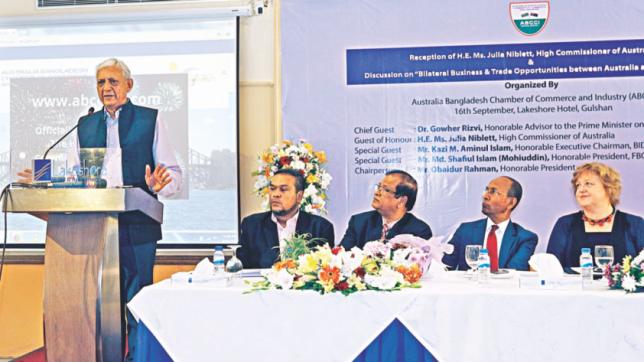Credit for 7pc growth goes to political stability

Political stability and growing maturity of democratic institutions have helped Bangladesh's economy achieve more than 7 percent growth, said Gowher Rizvi, prime minister's international affairs adviser.
Bangladesh has achieved extraordinary improvement in every social and economic indicator and attracted huge foreign investment in the last one decade thanks to the stable political environment, he said.
Rizvi spoke at a discussion on “Bilateral business and trade opportunities between Australia and Bangladesh” at the Lakeshore Hotel in Dhaka yesterday. The Australia Bangladesh Chamber of Commerce and Industry (ABCCI) organised the event.
The political atmosphere will remain stable in the future as the national election will be held on time, he said.
Rizvi said there will be no impediment for any political party to participate in the election and there is no question about the national polls, which will be held as per rules and will be free and fair.
The result of the election may remain unpredictable, but the economic policy will remain predictable and have continuity, he said.
The adviser urged Australian investors to come to Bangladesh and take advantage of the low-cost labour and political stability.
Political stability is prevailing in the country as the culture of destructive politics has come to an end, said Shafiul Islam Mohiuddin, president of the Federation of Bangladesh Chambers of Commerce and Industry.
The economic indicators are attractive for new foreign investment and the environment is business-friendly, he said, adding that foreign investors can easily repatriate money now.
The government of Bangladesh should facilitate the Australian businesspeople who are looking to start new businesses in the country to boost trade ties with Australia, said Julia Niblett, Australia's high commissioner to Dhaka.
There are lots of opportunities for the government to engage Australian investors in Bangladesh's education and energy sectors, she said.
Australia mainly exports cotton and dairy products to Bangladesh and imports garment, textile, sea food, and leather goods from the country.
The relatively balanced bilateral trade stood at more than $2 billion last year, according to the ABCCI.
Australia has huge expertise in service and vocational education which can be used in Bangladesh, Niblett said.
She identified rising tariff and slow pace of the decision-making process as challenges for Bangladesh to attract foreign investors.
The government is trying to improve the business climate by developing legal institutions and investing in human capital, said Kazi M Aminul Islam, executive chairman of the Bangladesh Investment Development Authority.
He said Bangladesh is the second largest garment exporter in the world, so Australian investors can tie up with the businesses in the local apparel sector.
